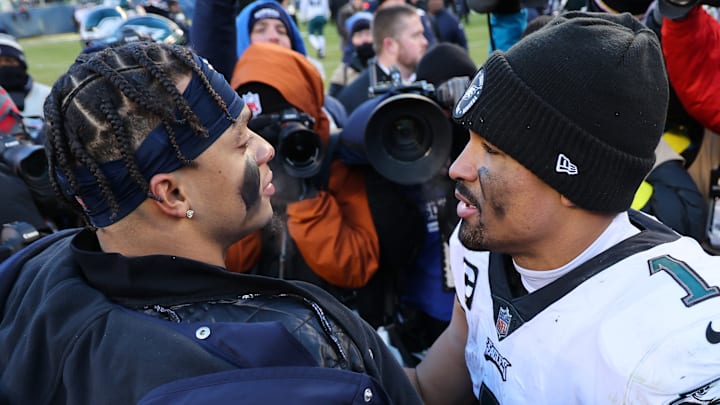The Philadelphia Eagles shocked the NFL world by trading for Kenny Pickett on Friday. One day later, the Pittsburgh Steelers landed Pickett's replacement, acquiring Justin Fields from the Chicago Bears. Regardless of price, that feels like a victory for Pittsburgh. Factoring price into the equation, however, shines a harsh light on the Eagles' decision.
Philadelphia essentially swapped a third-round pick (No. 98) for a fourth-round pick (No. 120) to land Pickett, in addition to two future seventh-round picks. That is perfectly reasonable for a 25-year-old quarterback with Pickett's pedigree. Now the Eagles can rest assured that Jalen Hurts' backup is, at the very least, competent.
On the other hand, Pittsburgh acquired Justin Fields in exchange for a single 2025 sixth-round pick. It becomes a fourth-round pick if Fields plays 51 percent of snaps next season, but he is expected to back up Russell Wilson. So, odds are, a sixth-round pick is all Pittsburgh sacrificed.
The Eagles paid significantly more for Pickett than the Steelers did for Fields. Isn't that a bit backwards?
According to ESPN's Dan Graziano, the Eagles checked with the Bears about a potential Fields trade, but could not agree on a price. Thus the Pickett trade. Considering how much lower the asking price was for Fields, it's clear teams around the league simply do not value the Ohio State product.
Eagles should have traded for Justin Fields instead of Kenny Pickett
There are a couple factors at play here. The primary motivation for Philadelphia is money. Pickett is slated to make $2.6 million in the 2025 season. Fields comes with a 2025 club option worth $25.7 million, which the Steelers now have to decide on by May 2. The affordability of Pickett beyond 2024 is certainly a mark in his favor.
On the field, however, Fields is plainly better. If not better, he at least possesses a higher individual ceiling. Pickett proved that he can manage an offense on the most basic level, but he doesn't have the arm talent or the confidence to stretch defenses and push the ball downfield. With Fields, there is legitimate dual-threat equity. He can extend plays outside the pocket and generate yards on the ground — not unlike Philadelphia's starting QB.
That alone should have motivated the Eagles to get a deal done with Chicago. Fields is a pale imitation of Jalen Hurts. That makes it easier to transition from starter to backup in a pinch without overhauling the playbook. Pickett cannot run all the same plays as Hurts. With Fields, the designed runs and the goal-line formations all hold up.
We shouldn't understate the longevity factor, but for the Eagles, long-term "upside" at the QB position is borderline unnecessary. The Eagles are locked in with Hurts for the foreseeable future. If Fields plays well, he will sign a more substantial contract elsewhere. The same for Pickett, only he hits the market a year later. The Eagles paid the premium for an extra season of Pickett, while sacrificing imminent quality. Pickett is still one of the best backup QBs in the NFL, also with upside at 25 years old. But, he's not the best, and Fields would have been the perfect schematic fit for Philadelphia.
The fact that the Eagles could have paid less for Fields seals the deal. Just sign another backup QB next season when Fields inevitably bolts. Pickett is tremendous as far as backups go, but there's no reason to kid about his "future" in Philly. He is a permanent QB2 until his contract expires. At that point, if he has done anything of value, he will get paid more by another team.
These are both marginal moves, and Fields' future is much brighter in Pittsburgh. This certainly isn't enough to warrant hard-edged criticism of the Eagles front office. But, in a perfect world, Philadelphia would have dealt for Fields and left Pickett to the next highest bidder.
